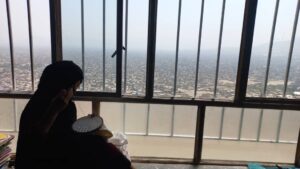
45-year-old Gulsoum, who worked in a foreign company, says; With the prohibition of women’s work in foreign institutions and the closure of these institutions, families in Afghanistan are facing economic problems
many Afghan mothers, women and sisters have affected in Afghanistan by the recent wars, besides the loss of loved ones, economic problems and traditional restrictions are affecting these women.
Following the imposition of restrictions by the Taliban on women in Afghanistan, this group has banned women from working in domestic and foreign non-governmental organizations.
Women are facing economic problems who were working in foreign institutions in Afghanistan due to the prohibition of working in these institutions
One of the women who working in the Pamlarena, one of the foreign institutions in Afghanistan, told her painful life story to Farkhunda News and said, “When the work of women in domestic and foreign institutions was stopped, we became miserable.”
45-year-old Gulsoum is a resident of Chehelstun, Kabul city
16 years ago, her husband had a heart attack and after twenty days died in hospital, leaving her with a big responsibility of taking care of her eight children.
Gulsoum’s husband during his lifetime was an employee of the Ministry of Foreign Affairs, and he served in this ministry for 9 years.
Gulsoum says; She was 8 months pregnant that she buried all her wishes with her husband in the ground after losing her husband.
she was working for one of the foreign organizations “Pamlarena” in order to find a bite of halal bread for his orphaned children.
This institution provided work and support for women. Women sewed quilts for this institution and they were paid for their efforts.
With these money, Gulsoum spent the day and night for himself and her children, until her children grew up and became their mother’s helpers.
Now Mrs. Gulsoum is unemployed, she has no choice but to stay at home and she can’t afford other jobs
she says: that they are facing economic problems and with the change of the government system and the closure of foreign and domestic institutions and the changing conditions for women, the life of her and her daughters is getting harder every day.
Gulsoum does hand embroidery at home, but complains about the lack of a suitable market
she says that I sent my daughters to school with hundreds of problems so that they can become literate and use from their pen and knowledge to cover the expenses of life and be independent, but my daughters are getting more and more disappointed every day with the closure of universities and schools.
Gulsoum’s daughters help her in the embroidery work.
Gulsoum’s eldest son is a teacher in a private school and his second son is a student in a public school in Kabul city.
Ms. Gulsoum’s three daughters, who had just started university, but now are living without a destiny, and the other three daughters of this lady are also student at school.
Marzieh is Gulsoum’s eldest daughter. She says: “I only wanted to become a doctor to serve my family and people and to have a better life than before.”
Gulsoum’s little daughter, Zakia, who has never see her father, is also a 9th grade student, and her only wish is to open the doors of schools to students.
Gulsoum is satisfied and happy with foreign institutions and organizations and with the work of these institutions in the field of women’s empowerment and also the independence of women in the economic sector, and considers the closure of such institutions necessary in the poor society of Afghanistan.
she says that Afghanistan is a country that has always been at war and women have suffered more than men in these wars and many women in Afghanistan have lost their husbands in wars and are widows, all the responsibilities of Home and children are on women, work is an essential need for this segment of society
she asks foreign institutions and organizations to be with the people of Afghanistan and not to leave them alone in difficult situations.
Ms. Gulsoum adds;
If there is no work, the families are forced to send their children to do hard work or go to Iran, which causes the children to be away from their families and elders to drugs and illegal activities.
Ms. Gulsoum says that although they had a bad economic situation, she did not force her son to work on the road and elsewhere and encouraged them to study.
In his last words, Gulsoum told Farkhunda News: I wish my daughters would study like my sons so that they don’t the bitter experience of illiteracy in life like I did.
Sohila Gulstane
